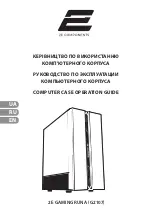
2 Remove the latch from the helmet by pulling it outwards so that the latch inner
bayonet “A” comes out of its housing in the visor mechanism (see Fig. 19).
3 Follow the same steps on the right side of the helmet.
4 Remove the peak by holding its side end and bending it outwards so that the hole
“B” of the peak comes unhooked from the visor mechanism and the inner pawl
“C” inside the peak comes out of its housing in the visor mechanism (see Fig. 18).
5
Repeat the steps 1, 2, 3 and 4 of the visor assembly section.
•
(Available as an optional accessory)
1
PINLOCK
®
INNER VISOR ASSEMBLY
1.1 Remove the visor.
1.2 Make sure that the inner surface of the visor is clean and check that the pin adju-
stment external levers are turned inwards.
1.3 Place the Pinlock
®
inner visor on the visor. WARNING: The silicone-sealed pro-
file of the Pinlock
®
inner visor should be in contact with the inner surface of
the visor.
1.4 Insert one side of the Pinlock
®
inner visor on one of the visor pins and hold it in
position (Fig. 21).
1.5 Widen the visor and fasten the other side of the Pinlock
®
inner visor to the second
pin (Fig. 22).
1.6 Release the visor.
1.7 Remove the protective film from the Pinlock
®
inner visor and check that the enti-
re silicone-sealed profile of the inner visor adheres to the visor.
1.8 Fit the visor in the helmet.
CHECKING AND ADJUSTING THE INNER VISOR STRETCHING
Check the correct system assembly by opening and closing the visor. Check that
both visors are correctly fastened and do not move.
If the inner visor is not tightly fixed to the visor, move the external adjustment levers
simultaneously upwards to increase the stretch (Fig. 23). This operation must be car-
ried out gradually. The maximum stretch is achieved when the pin adjustment exter-
nal levers are turned outwards.
WARNING!
The presence of dust between the two visors may produce scratches on both surfaces.
Scratched visors and inner visors may cause reduced visibility and must therefore be
replaced.
Regularly check the correct stretching of the inner visor to prevent the same from
moving and scratching both surfaces.
If the helmet visor fogs up and/or condensation forms between the visors, check
both for system correct assembly and stretching.
20
Summary of Contents for N43E AIR
Page 82: ...82...
Page 83: ...83 E v...
Page 84: ...84 N 43 E AIR 1 1A 90 1 B 2 A 2 3 4 B C 3 1 C B 3 2 A 2 3 90 1 4 Nolan 1 1 2 4 JET...
Page 88: ...88 1 4 14 1 5 2 2 1 2 2 15 2 3 14 2 4 13 VPS 1 4 2 2 2 5 12 11 30 C max...
Page 89: ...89 1 1 2 3 4 2 D 16 3 D 17 4 2 3 R L 1 1 2 3 4 2 C B 18 3 A 19 4 90 20 1 5 Nolan 1 1A 90 1 B...
Page 91: ...91 2 PINLOCK 2 1 Pinlock 2 2 Pinlock 24 2 3 Pinlock 24 25 A B B...
Page 92: ...Fig 4 Fig 5 Fig 6 Fig 7A Fig 7B Fig 1B Fig 1A Fig 2 Fig 3 A B C...
Page 93: ...Fig 11 Fig 12 Fig 15 Fig 13 Fig 14 Fig 8 Fig 9 Fig 10...
Page 94: ...MIN MAX Fig 18 Fig 19 Fig 21 Fig 22 Fig 23 Fig 16 D D Fig 17 D C B A Fig 20...
Page 95: ...Fig 24 Fig 25 A B A B C D E F...















































